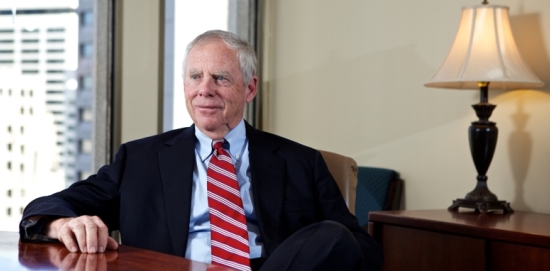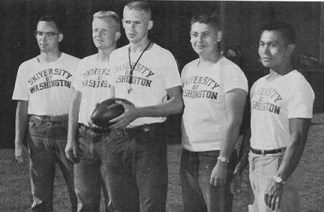Artie Buerk: the networker’s effect
 Catalyst of ventures and connector of people, Artie Buerk has financed the future of entrepreneurship at the University of Washington.
Catalyst of ventures and connector of people, Artie Buerk has financed the future of entrepreneurship at the University of Washington.
It began with a gift. An investment, really, in an idea that had yet to be so much as scribbled on a cocktail napkin.
In 1990, Artie Buerk (BA 1958) and his wife Sue (BA 1974) pledged $100,000 to support entrepreneurship at the UW Business School. The problem? There was no entrepreneurship to support. No center, no program, no business plan competition, not even a single class.
A vigorous catalyst of new ventures, Buerk insisted that this deficiency be addressed. Immediately.
“My whole life has revolved around startups and small businesses, the engines of the Northwest economy,” he says. “I felt the UW should have a program to educate future entrepreneurs.”
Buerk found a small cabal of faculty with similar leanings. Most prominent among them was Borje “Bud” Saxberg, then chair of the Department of Management, who had noted the region’s uptick in entrepreneurial activity. “The answer was there,” recalls Saxberg, “waiting for action.”
Artie equaled action. He helped Saxberg’s task force sketch the original Program in Entrepreneurship and Innovation, and taught them how to raise the capital to launch it.
That was the seed. From it has grown a veritable dynamo of entrepreneurial education and activity, centered at the Foster School of Business but increasingly reaching across the University of Washington. Now that dynamo has been renamed the Arthur W. Buerk Center for Entrepreneurship, in honor of the Buerks’ recent $5.2 million gift to finance its future.
“Artie always says that there’s no shortage of ideas. But we need leaders who can take those ideas and turn them into something valuable,” says Jim Jiambalvo, dean of the Foster School. “With the Buerks’ support of our entrepreneurship center—the Buerk Center—we’ll create more entrepreneurial leaders, and we’ll extend our reach to discover those young people who don’t yet realize they have the entrepreneurial DNA.”
Startup
Buerk realized it early on. His first business was a Seattle Times paper route in his childhood neighborhood north of Matthews Beach.
He studied business at the UW, served as a supply officer on a destroyer in the US Navy, then earned an MBA at the Harvard Business School. Several years with big corporations convinced him that he was meant to build from the ground up.
One of Buerk’s first entrepreneurial challenges came, ironically, back at the UW. In 1968, he was hired to direct its fledgling alumni fund and development office. The bare-bones operation was raising a paltry $40,000 a year. “We were 25 years behind other public universities and 200 years behind the Ivy League Schools,” he says. “To me, it was a real opportunity.”
Buerk studied the field’s best practices, modernized the alumni database and department infrastructure, and increased the donor base exponentially—on his own and with a crackerjack staff. His early hires included Marilynn Dunn, the UW’s influential first vice-president of development, and Robb Weller, the legendary King of the Yell Squad, who could single-handedly light up a crowd of 70,000.
Buerk’s team of strivers got the private support flowing. By 1977, his operation was raising nearly $20 million a year (a legacy that has climbed to an annual $320 million today).
“It was entrepreneurial, something I had a real passion for,” Buerk says. “I’ve never had a job that was more fun.”
Back in business
Buerk’s expertise in raising money became a valuable asset. In the late ‘70s a couple of old friends, Chuck Barbo and Don Daniels, recruited him away to help finance their odd-lot portfolio of small businesses—among them Christmas tree farms, raw land, horse arenas, and a self-storage business.
As president—and an investor—Buerk convinced the founders to focus on the storage businesses, to be renamed Shurgard. And he helped Barbo and Daniels methodically build a nationwide brand, raising $750,000,000 for the expansion through a vast constellation of brokered deals.
Buerk spun off a successful records management company called Intermation and helped take Shurgard public in 1994 before moving on.
His investment had grown exponentially. And now the money was liquid.
So Buerk put it to new work. He founded the Seattle School Fund for Excellence (now the Alliance for Education). And, with a group of partners—“A who’s who of the Foster School’s Advisory Board”—he turned a 401K division of Washington Mutual into Northwestern Trust (acquired by Harris Trust).
In 1997, he co-founded the private equity firm of Buerk Craig Victor, now Montlake Capital. It was the heyday of the Internet boom, when capitol gushed toward anything with a .com suffix. But Buerk was a skeptic. He chose to invest in firms that demonstrated solid fundamentals—proven products/service, realistic projections, genuine leadership. Over the next decade-plus, he opened a new branch of legacy, molding growth companies and mentoring their leaders—from Door to Door Storage to Blue Dog Bakery, from HaloSource to SOG Knives.
People person
Whatever the business, Buerk’s true business has always been people. His vast personal network is legendary, and ever growing.
“Artie knows everyone, and everyone knows Artie,” says venture capitalist Neal Dempsey (BA 1964), a fellow founding champion of entrepreneurship at the UW.
It is, perhaps, because Buerk takes networking more personally than most. He had to. “My father died when I was 11, and it was just my mom and me,” he says. “If I was going to have a family, I knew I was going to have to build it out of friends and relationships.
“And that’s the way I look at it: not just a network, but my extended family.”
It’s a philosophy with a long-term perspective.
“Some people think of networking in terms of what they can get out of it,” says Kris Lindquist (MBA 2011), the director of strategic business development at Amazon.com who met Buerk through Foster’s MBA Mentorship Program. “But Artie gives twice as much as he takes. He pays it forward.”
He’s the consummate connector of people who show intelligence and initiative.
“If you want to know who to talk to in an industry or about a specific topic, Artie will typically know someone off the top of his head,” adds Sara Weaver (BA 1991, MBA 2001), a Buerk Center advisor who once worked at Buerk Craig Victor. “And he is very generous with his contacts and resources. He takes a real interest in helping people grow and succeed.”
“Building and maintaining relationships makes your life a lot more successful and valuable,” adds Buerk. “The greatest thing, to me, is to see the success of someone you’ve helped.”
Bow Down to Washington
 Most of Buerk’s connections seem to triangulate with the UW. He splits allegiances with the Harvard Business School (he’s been a dedicated class secretary for 50 years). “But my blood is purple and gold,” he confirms.
Most of Buerk’s connections seem to triangulate with the UW. He splits allegiances with the Harvard Business School (he’s been a dedicated class secretary for 50 years). “But my blood is purple and gold,” he confirms.
It’s a loyalty forged during busy, happy days as an undergrad. Bussing in to Roosevelt High School from Seattle’s northern frontier left little time for involvement. So Buerk resolved to engage in the life of the UW in every possible way. He studied business in the classroom, but learned to lead all over campus. Managing the Husky football and basketball teams. Training with Naval ROTC. Running the campaigns of the student body president and vice president. Serving as senior class officer, president of the Oval Club and member of Fir Tree.
Buerk was named “Outstanding Senior Man.”
He graduated, but never really left. After his decade as the UW’s first professional fundraiser, Buerk was a trustee of the UW Foundation and chair of the UW Development Fund. He taught personal finance through UW Extension for years. He’s a past president and board chair of the UW Alumni Association. He serves on the advisory boards of the Information School and the Foster School, having chaired the Foster board through the final years of the last capital campaign. He’s also mentored for years at Foster, and is on the board of the UW Angel Fund.
For these many decades of service—multiplied by the thousands he inspired to do the same—the UW honored Buerk with its 2007 Gates Volunteer Service Award.
The recipient claims he has got more than he’s given: “I’ve never had any association with the U that hasn’t been fun and successful,” Buerk says. “It’s hard to replicate that record in any other element of life.”
Center of attention
And few UW touchpoints have been as satisfying or successful as the mature, innovative center that has grown from Buerk’s somewhat speculative investment two decades ago.
To a brand building expert, “Buerk Center” has a nice ring to it. It certainly says something about the institution.
“There’s no one more deserving to have his name atop the center than Artie,” says Neal Dempsey, whose own name graces the building that houses it. “It’s a hugely meaningful gift, and a hugely meaningful name. Artie is the best there is.”
True to form, Buerk wants the center—already in the Entrepreneur top ten—to be the best there is. He applauds the work of director Connie Bourassa-Shaw and her staff to elevate the original vision to an incredible vibrancy of practical activity and education. And he hopes this new infusion of resources from the naming gift fuels the center’s ongoing expansion throughout the UW system.
“The UW brings 45,000 brilliant people to a 640-acre spot to work every day,” Buerk says. “Our job is to turn that brain power into businesses that will be good for their founders, good for the university, and good for the Northwest economy.
“If we can integrate entrepreneurship into the fabric of the University, engage all kinds of students and faculty in the process, get them thinking of great ideas as potential businesses, we will have something that’s very powerful.”
Power is what the Buerks have provided the Buerk Center for Entrepreneurship.
“A naming gift is the best endorsement,” says Bourassa-Shaw. “It’s an amazing vote of confidence. It says, I so believe in you that I’m proud to have my name associated with you for decades to come. It says, I’m betting money on your future. It says, I trust the center to do the right thing for students, for the UW, for Seattle. This is Artie’s legacy.”
The latest and greatest of many.
